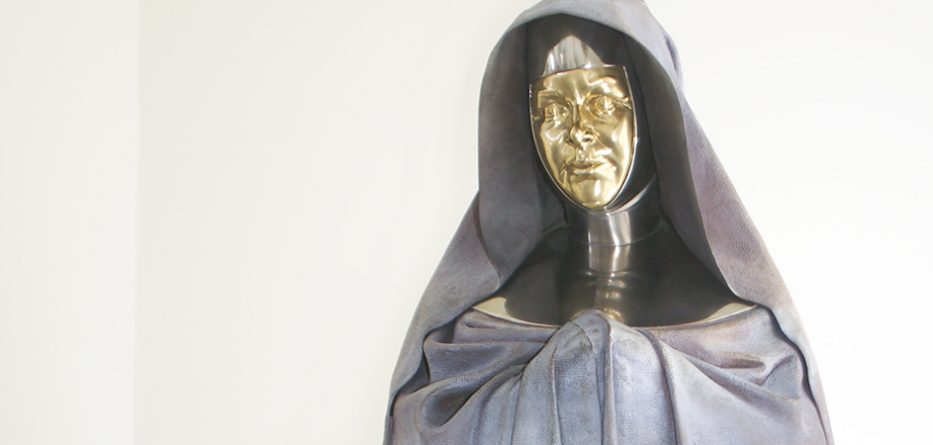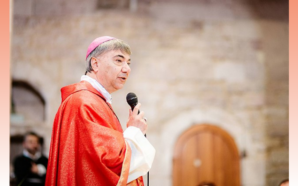Homily for the Solemnity of St Mary of the Cross MacKillop, National Patron
Readings: 1 Kings 17:8-16; Psalm 62(63):2-8; Colossians 3:12-17; Matthew 6:25-34
8 August 2021
Today we celebrate the feast of St Mary of the Cross MacKillop. I happened to be in Rome attending a Jesuit meeting 11 years ago when Mary was canonised as Australia’s first officially recognised saint. The day after the canonisation, I attended the mass at St Paul’s Outside the Walls. The celebrant was Cardinal George Pell. He was assisted by the Aboriginal deacon Boniface Perdjert from Wadeye, Port Keats. The Josephite sisters put together a superb liturgy. It was a great occasion.
In his Prison Journal, Cardinal Pell reflected on that liturgy. He wrote on 12 February 2020:
“One of my proud moments as archbishop of Sydney was to preach at the Mass in the Basilica of St Paul Outside the Walls in Rome for the seven to eight thousand Australian pilgrims who were present for the canonisation of St Mary MacKillop in 2010. Although I had worked hard to prepare a sermon that was religiously adequate for such an important occasion, I was surprised at how well it was received.” And it was. I thought it was marvellous.
LISTEN: https://soundcloud.com/frank-brennan-6/homily-8821
While in prison in February last year, Cardinal Pell read a biography of the early NSW Governor Lachlan Macquarie. He noted in his Prison Journal that “Macquarie opened up Australian society so that capable people could get ahead and make a contribution, even if they had earlier made big mistakes or came from poor and less educated families”. He added “that it was the likes of St Mary MacKillop and her Josephite Sisters who enabled the children from these families to benefit from the human advantages which accompany faithful Catholic lives and exploit the openings in Australian life which Macquarie and like-minded leaders had opened up.” From his prison cell, Pell mused about the gathering at St Paul’s Outside the Walls in Rome, “My Australian congregation, far from home, was there to celebrate St Mary of the Cross, but was also grateful for the traditions which Macquarie created.”[1]
In his homily 11 years ago, Cardinal Pell said:
“Mary did not like suffering and did not go looking for trouble. Her title ‘Mary of the Cross’ was for her a happy one, which acknowledged the afflictions of daily life. She claimed ruefully ‘the little crosses of everyday life are harder to bear than the thumping big ones’. But she was given a number of thumping big crosses. She was excommunicated by Bishop Sheil, a foolish and arrogant man, who let himself be misled by priestly lies. She was slandered, saw her sisters divided, (and) suffered unjustly in a second enquiry”.[2]
The treatment Mary received by a succession of bishops was indeed appalling. Pell was right to describe Bishop Sheil as “a foolish and arrogant man”. Sheil purported to excommunicate Mary in 1871. But 12 years later, she was to suffer again at the hands of another bishop of Adelaide, Archbishop Christopher Reynolds who pretended to set up a commission of inquiry into the Sisters with Vatican approval. At the end of the inquiry which was a farce from go to woe, Reynolds ordered Mary “to prepare at once to leave for Sydney, as you have no longer the confidence of the Sisterhood, nor is it in the interests of good order and of discipline, of peace or religion that you should remain in this Province”[3].
The late Fr Paul Gardiner SJ who prepared much of the material for Mary’s canonisation concluded, “After due allowance has been made for the mistakes of leading churchmen, for the pathetic mental state of the Bishop and for the possibly guiltless consciences of all, it is no service to the Christian or human cause to be mealy mouthed about what happened in Adelaide in 1883. Mother Mary and the Sisters of Saint Joseph were the victims of gross breaches of justice and charity.”[4] For her part, Mary wrote, “From all I can gather our poor Bishop has made a great mistake.”[5] She wrote to another saying, “The whole affair is a mystery to me, but I hope God will be glorified in the end and His most holy will worked out.”[6] It took five years before she felt able to write to Reynolds saying, “I have often wished to write to you but had not the courage until today. ….There have been times when I have felt most keenly and I fear for the moment resented things I have heard you said about me… but I always wished you well and longed at any personal sacrifice to assist rather than to cause you any personal annoyance.”
She continued: “I dearly love South Australia and wish it every blessing. I hope to live to see its Archbishop and the Sisters of Saint Joseph working heart and soul for the one great cause, the one supporting and encouraging the children of the Congregation who are working under his Fatherly care and the other repaying with grateful affection the kindness bestowed upon them.”[7] Reynolds thought the letter was insolent.
I recount this history aware that we are preparing for a Plenary Council in Australia, and relations are somewhat strained between our bishops and some of the faithful who, having dedicated their lives to the Church, are worried about what will become of our Church as their children and grandchildren lose faith and interest in the institution.
Professor John Warhurst will be a delegate to the forthcoming Plenary Council. He has just published a book entitled Wrestling with the Church Hierarchy: Engaging with the Plenary Council and Beyond, in which he states: “If we reforming laity did not appreciate the size of the challenge before us when we began our journey we certainly do now. The task of reforming a huge and fragmented institution like the Catholic Church from within is enormous. Yet reformers must continue to chip away at entrenched resistance by those in authority to much-needed modernisation. The future of our children and grandchildren demands it.”[8]
The Instrumentum Laboris, the working document for the Plenary Council, contains a very underwhelming section on The Contribution of Women. It states:
“[T]he perceived underrepresentation of women in formal leadership and decision-making roles is a challenging issue for many in Australia. So too, for some, is the exclusion of women from ordained ministry, notwithstanding the Church’s formal teaching on this matter. In Evangelii Gaudium, Pope Francis spoke of a need for greater discernment on ‘the possible role of women in decision-making’.”[9]
In the latest instalment of his Prison Journal published this week, Cardinal Pell’s entry for 18 February 2020 describes his conversation with Archbishop Fisher just days after Pope Francis published Querida Amazonia following the Amazon Synod in which Pope Francis omitted any commitment to women deacons despite the synod members having voted 137 to 30 in favour of the Pope investigating further the possibility of women deacons. Cardinal Pell wrote: “I asked the archbishop whether he took credit for the Holy Father’s decision to maintain priestly celibacy and not endorse the diaconate for women. He demurred, but insisted he had clearly expressed his views on these issues to many people.”[10]
Prior to the Amazon Synod, Cardinal Pell had written in his Prison Journal:
“I do not support the reintroduction of women deacons, although there were non-ordained women deacons in the ancient Church in the East and West. Disruptive elements would use such a change as a step toward women priests. Another important procedural point is that pastoral and, even more importantly, doctrinal changes with universal implications and consequences should not be introduced surreptitiously through local synods”.[11]
A couple of weeks ago, I preached about the possibility of women deacons. Someone following these developments very closely wrote to me saying: “To me, it is seriously embarrassing that the Church will not grow up and persists in excluding more than half of its adherents, and some of the most effective to boot…Are you sure the modern version of discernment is not code for ‘NO ACTION’?”
I am not suggesting that our present Australian bishops display the same incompetence, foolhardiness and dishonesty as did Sheil and Reynolds. But I ask myself on this occasion of Mary MacKillop’s feast, what consolation, inspiration or advice would she offer to Plenary Council delegates like John Warhurst who think in good conscience that now is the time for the Australian Church to discern questions like priestly celibacy and women deacons, and who think that the bishops opposed to any change to priesthood or diaconate are failing to read the signs of the times? These delegates are on notice that some of our most powerful bishops consider these questions to be off the table completely, regardless of what might be said or discerned at the Plenary Council. For them, these are not questions at all. The answers are what they have been throughout recent centuries, regardless of earlier church practices, and regardless of how unsustainable is a celibate male clergy in the Australian church.
Having suffered ex-communication at the hands of the foolish and arrogant Bishop Sheil, Mary travelled to Rome. The Superior General of the Jesuits took her under his wing. They met 26 times. She was granted an audience with Pope Pius IX. Ten days after her arrival in Rome she wrote, “To me, the will of God is a dear book which I am never tired of reading, which has always some new charm for me. I cannot tell what a beautiful thing the will of God seems to me.”[12]
I hope and pray that Plenary Council delegates like John Warhurst will be heard as they read from that dear book. In the words of today’s gospel for the feast, let’s set our hearts on his kingdom first, and his righteousness, and all these other things will be given us as well. “So do not worry about tomorrow; tomorrow will take care of itself. Each day has enough trouble of its own.” Discernment cannot be code for ‘No Action’. All our bishops need to appreciate and acknowledge that some of the crosses being carried by parents and grandparents are thumping big ones, while the young stay away, bemused that any 21st Century institution could continue to privilege a caste of celibate males in God’s name. Thank God, the Macquarie-MacKillop dynamic still fires imaginations in the Great South Land of the Holy Spirit.
Fr Frank Brennan SJ is the Rector of Newman College, Melbourne, and the former CEO of Catholic Social Services Australia (CSSA).
[1] Excerpt from Cardinal George Pell, Prison Journal, Volume 3, Week 51, Apple Books.
[2] Cardinal George Pell, Homily, 18 October 2010, available at https://www.sosj.org.au/wp-content/uploads/_cknw/files/Homily%20-%20Cardinal%20Pell%20-%20Rome,%2018%20Oct%202010.pdf
[3] Letter of Bishop Christopher Reynolds to Mary MacKillop, 13 November 1883, quoted in Paul Gardiner, Mary MacKillop: An Extraordinary Australian, David Ell Publishing, 1993, p. 299
[4] Paul Gardiner, Mary MacKillop: An Extraordinary Australian, David Ell Publishing, 1993, p. 308
[5] Letter of Mary MacKillop to Sister Calasanctius, quoted by Gardiner, p.305
[6] Ibid, Letter of Mary MacKillop to Rev Dr I. F. Campbell.
[7] Letter of Mary MacKillop to Archbishop Reynolds, quoted by Gardiner, p.347
[8] John Warhurst, Wrestling with the Church Hierarchy: Engaging with the Plenary Council and Beyond, Garratt Publishing, 2021, pp. 191-2
[9] Plenary Council, Instrumentum Laboris: Continuing the Journey, para 55 available at https://plenarycouncil.catholic.org.au/wp-content/uploads/2021/02/IL-document-spreads.pdf
[10] Excerpt from Cardinal George Pell, Prison Journal, Volume 3, Week 52, Apple Books.
[11] Cardinal George Pell, Prison Journal Volume 2, p. 186, 2 October 2019. The final document of the Amazon Synod published on 26 October 2019 stated: “In the many consultations carried out in the Amazon, the fundamental role of religious and lay women in the Church of the Amazon and its communities was recognized and emphasized, given the wealth of services they provide. In a large number of these consultations, the permanent diaconate for women was requested. This made it an important theme during the Synod. The Study Commission on the Diaconate of Women which Pope Francis created in 2016 has already arrived as a Commission at partial findings regarding the reality of the diaconate of women in the early centuries of the Church and its implications for today. We would therefore like to share our experiences and reflections with the Commission and we await its results.” See para 103 available at
https://www.vatican.va/roman_curia/synod/documents/rc_synod_doc_20191026_sinodo-amazzonia_en.html
[12] Letter of Mary MacKillop to Monsignor Tobias Kirby, 22 May 1873, quoted by Gardiner, p.134








